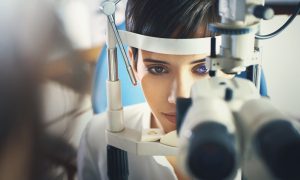Women are at Higher Risk for Vision Problems than Men

According to the report for the 2015 National Health Interview Survey, 23.7 million American adults age 18 and older experience vision loss. Having vision loss is defined as having difficulty seeing or being unable to see at all, even when wearing glasses or contact lenses.
Women are much more likely to experience vision loss than men. In fact, almost two-thirds of all individuals who are visually impaired are female. This means that women need to be especially attentive to their vision needs because they are at higher risk for eye issues. Here are four reasons women are more likely to be visually impaired.
- Life expectancy — Women have an average life expectancy of 81 years compared to 76 years for men. Many eye diseases like cataracts, glaucoma and macular degeneration are associated with age, so women are more likely to develop degenerative eye disease simply because of their gender.
- Hormones — Menstruation, pregnancy and menopause are all driven by hormones, and fluctuations in hormones can also affect vision. It is also suspected that hormonal changes contribute to dry eye syndrome, especially after menopause.
- Risk for auto-immune disease — Autoimmune diseases such as lupus, rheumatoid arthritis and multiple sclerosis are more common among women, and these conditions can also affect sight loss.
- Social and economic factors — Limited financial resources and inadequate health care can affect the frequency of preventative care visits like comprehensive eye exams. Women often will put aside their own check-ups to allocate health care funds to another family member.
Vision loss can be prevented or delayed through early detection and early treatment. Annual comprehensive eye exams are the best way to keep your vision healthy whether you are male or female. Eye disease and vision impairment is costly and can require expensive medications and treatment. A yearly check-up of your vision is a worthwhile investment because it can reduce medical expenses in the future. Take some time today to call your ophthalmologist and schedule an eye exam for the whole family.
